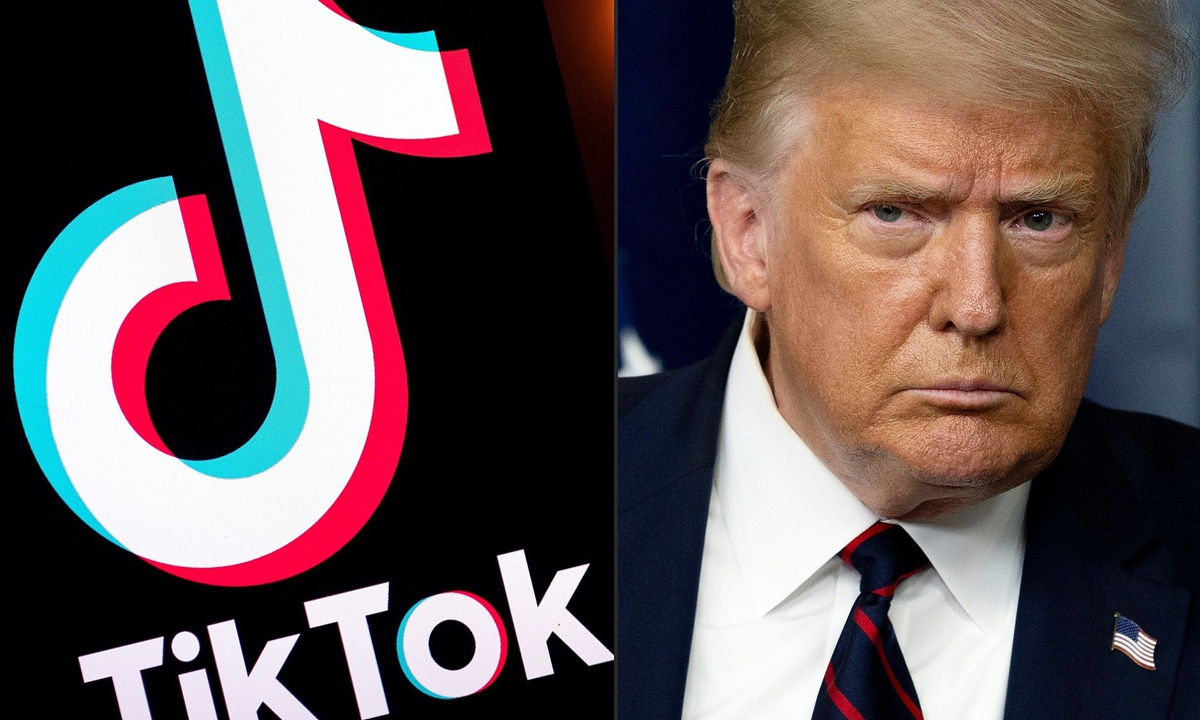Countries mull reducing reliance on US tech in wake of TikTok drama
By GT staff reporters Source: Global Times Published: 2020/8/5 16:23:08 Last Updated: 2020/8/5 22:03:08

TikTok Photo: VCG
As the US shocked the free world with its mafia-style forced sale of Chinese-owned short-form video platform TikTok, Chinese experts said that US extortion and looting have left a deep impression in the minds of nations around the world, and pointed out that many of the countries are already striving to boost self-reliance in terms of security, industrial independence and technological ownership.
The US' extortion of TikTok, simply because it is not an American firm and is hugely successful in the US, has served as a vivid lesson to other countries. The US' actions have drawn widespread criticism in the press from the EU to Russia.
Chinese analysts said in the face of an increasingly unreasonable US, which tends to abuse its status as the world's largest economy with its financial and technological supremacy, countries such as Germany, France, South Korea and Japan are increasing their overall independence to mitigate the risks of being extorted by the US.
In the EU, where memories of the US' extortion of French company Alstom that led to a partial acquisition of its assets by General Electric are still fresh and the "America First" approach of pre-ordering French pharmaceutical giant Sanofi's COVID-19 vaccines sparked public outrage as recently as May, countries are mulling to increase their self-reliance in the telecommunications, energy, defense and high-tech sectors.
The US' "America First" approach to free trade has drawn open criticism from political leaders in the EU, including German Chancellor Angela Merkel.
While the EU has a different relationship with the US compared to relations the US has with China, the EU nevertheless loathes the US' disregard of a rules-based world order, as the US' approach distorts the market economy, disturbing the market further, said Cui Hongjian, director of the Department of European Studies at the China Institute of International Studies.
"There is a rising awareness in the EU, coupled with concrete steps in recent years, of potential US extortion in the future," Cui told the Global Times on Wednesday.
Leading countries in the EU are certainly rethinking their reliance on US technologies and capital, Cui said.
The EU is also worried about its automotive industry becoming a victim of an increasingly ferocious competition between China and the US, with the latter's long-arm jurisdictions often hurting European suppliers to Chinese companies.
Although Europe has no internet tech giants of its own, it has in recent years boosted efforts to check the growth of US tech giants in the EU with more probes and tougher anti-monopoly regulations.
In February, the EU reportedly outlined a "generational project" to achieve its "technological sovereignty" by boosting its digital economy and avoid being overly reliant on foreign companies, according to a report by the New York Times.
In the energy sector, US sanctions against EU companies over the $11 billion Nord Stream 2, a natural gas project under the Baltic Sea transporting Russian gas to the EU and reducing its dependence on US gas, has been met with resistance from Germany, with German officials calling the sanctions serious interference in German and European sovereignty.
In 2019, Germany, France and Spain also announced plans for a next-generation European fighter plane, which is partly aimed at reducing the EU's dependence on the US. Italy, France and Germany also worked together to develop a drone program for the same purpose in 2015.
Observers noted that with the US constantly acting like a mafia organization, its former cooperation partners have no other option but to reduce their reliance on the US, leaving the country gradually isolated from the integration of global industries.
Besides the EU, Japan and South Korea, two smaller economies but each with considerable weight in the global industrial chain, are also devising their own plans.
Japan and South Korea, who have built up their own strength through years of efforts, generally depend less on the US in certain technology sectors like China. However, they are still under US control "in some key ways."
The possibility that the US may impose sanctions on Japan and South Korea through technology and other means cannot be completely ruled out in the future, Li Tianguo, associate professor at the National Institute of International Strategy, Chinese Academy of Social Sciences, told the Global Times on Wednesday.
Indeed, many of the elements of the current US campaign against China were not new, and had been contested in Japanese-US economic disputes 30 years ago, when Japanese firms like Toshiba and Fujitsu quickly dominated the global market, posing a threat to US firms.
Even with five Japanese companies ranking among the world's top 10 chip equipment firms, Japanese executives from these firms felt their hands were tied when the US employed its long-arm jurisdiction by barring US firms from selling technology to some Chinese firms in 2019.
Japan and South Korea are also strengthening technological innovation, under the slogan of an industrial revolution, and ensuring technological autonomy.
As the coronavirus pandemic weighs into the US' global leadership, there have been growing voices in Japan saying that "now is the time for Japan to reassess its over-reliance on its top ally and build its own defense capabilities," according to a report from the Nikkei Asian Review, citing leading national security expert Yuichi Hosoya.
Countries are also naturally turning to their homegrown efforts amid the tide of anti-globalization, a trend that has gained momentum largely thanks to the US.
In particular, after South Korea was subject to Japanese trade restrictions, it paid more attention to science and technology autonomy, and began to study and formulate science and technology development strategies, Li noted.
Posted in: DIPLOMACY